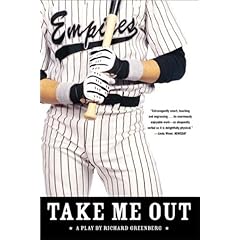 Dobama hits a home run with ‘TAKE ME OUT’
Dobama hits a home run with ‘TAKE ME OUT’Homophobia, racism, the meaning of masculinity, and the search for identity are at the very core of ‘TAKE ME OUT,’ Richard Greenberg’s drama with comic overtones, now being performed by Dobama .
‘TAKE ME OUT,’ which opened off-Broadway in 2003, became an instant success and was transferred on-Broadway later that same year. It ran for 355 performances and garnered the Tony Award for Best Play.
Professional sports is a world unto itself. There are written and unwritten rules, not only on how to play the game, but how to protect the “men’s club” that has been perpetuated in the world of athletics. For example, to date, no male major league baseball, football or basketball player has openly declared his homosexuality while being an active participant. The closest was Glenn Burke, the creator of the “high five” gesture, who played with the Los Angeles Dodgers and Oakland Athletics from 1976 to 1979. He was out to his teammates and team owners, but not to the general public.
In ‘TAKE ME OUT,’ Greenberg uses the precedence to ask the question,’ “What would happen if an active major league player did come out?”
Darren Lemming, a mixed-race star for the Empires (a Yankee-like team) is at the top of his career. He has a spotless reputation. For some unexplained reason he decides to "out" himself during a press conference. The result is a series of incidents which exposes how his relationships with teammates, media and fans changes.
While Lemming is the central character in the play, Greenberg uses another player, Kippy Sunderstrom, as the narrator to describe the action. As he leads us, we watch games unfold, locker room interactions, behind the scenes problems develop. We see how Lemming’s admission affects the team and individual relationships.
The situation reaches its climax when Shane Mungitt, a southern, uneducated, unworldly, new “phoneme” relief pitcher is asked a question at a press conference. Not knowing the “rules,” he goes off about “spics, gooks, niggers” and even the “faggot” he has to shower with after the game. In reality, his answer is not unlike that given by John Rocker, a former Atlanta Braves and Cleveland Indian’s relief pitcher, who caused a ruckus with is description of New York City in a Sports Illustrated article in January 2000. He said, "Imagine having to take the 7 Train to the ballpark, looking like you're riding through Beirut, next to some kid with purple hair, next to some queer with AIDS, right next to some dude who just got out of jail for the fourth time, right next to some 20-year-old mom with four kids.” The result, much like that in the play, was a public outcry and Rocker’s eventual suspension.
Dobama’s production, under the wise direction of Scott Plate, is outstanding. The acting is consistent, the pacing is generally excellent. The exception was the startling ending of the second act which was rushed and did not allow the audience to truly experience the extent of the havoc which they have just seen. A slow fade and holding the lights out at the end of the scene would have added to the tension. But, considering everything, that’s a minor issue.
Michael May evoked the necessary positive personal self-confidence and slightly below the surface vulnerability to make Lemming a real person.
Phil Carroll was attitude-perfect. He made it easy to understand why the intellectual and personable Kippy was the team’s leader, soul and conscience.
Caleb Sekeres was nothing short of astounding as Mason Marzac, a physically slight, nebbish-like gay financial planner, who was thrust upon Lemming after the star came out and the “big financial guns” didn’t want to be tainted by dealing with the now tarnished player. Sekeres not only falls in love with Lemming, but the game of baseball. His monologue when he exclaims, “Baseball is better than democracy--at least democracy as practiced in this country,” was a show highlight. It’s worth going just to experience Sekeres’s performance.
Fred Maurer, complete with ticks, spitting, confused look and verbal slurring, makes Shane Mungitt so very, very real. It’s a hard part to develop as Mungitt must be made to be sympathetic while being despicable. Maureer succeeds. Again, one of those special performances!
A combination of general poor articulation and disproportionate screaming in a key scene, made David Lemoyne (Davey Battle) often difficult to understand. He could have shown the same emotions without the excessive theatrics and yelling.
The rest of the cast was very proficient with each developing a consistent characterization. Adding to all of the usual character development issues was the need to feel comfortable while nude in several locker and shower scenes. There was no apparent discomfort on the part of the audience because the actors appeared at ease with their nudity and Plate had directed the scenes as a natural part of the entire locker room experience.
‘TAKE ME OUT’ is an intimate play. Jeff Herrmann’s set and Jeff Lockshine’s lighting helped establish the proper mood. Though the theatre in the square configuration sometimes led to not being able to hear some lines, depending on where the audience member was sitting, this was generally not a major problem. Aimee Kleiuber’s costumes were excellent. The mood of each scene was well set by sound designer Richard Ingraham’s selection of the different versions of “Take Me Out to the Ball Game” as they play progressed.
CAPSULE JUDGEMENT: ‘TAKE ME OUT’ is another of those outstanding productions that has become the hallmark of Dobama. It is a must see for anyone interested in baseball, social issues or just good theatre!

